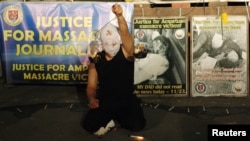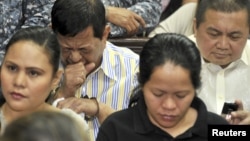MANILA —
On the third anniversary of the Philippines’ worst politically-related massacre, the trial drags on, while 92 suspects in the deaths of 58 people remain at large. The so-called “Maguindanao massacre” is described as the single deadliest event for journalists anywhere.
Maguindanao Governor Esmael Mangudadatu says he’s “disgusted” with the slow progress of the case against the people whom prosecutors allege killed his wife and other relatives in November 2009. But he remains optimistic.
“I am very confident that we could get the justice, the verdict, an optimistic Mangudadatu says. "It’s a matter of time. That’s why I kept on telling the prosecution and the judge to at least expedite the process of the hearing.”
Timeframe
But many say that “matter of time” can be very, very long. Manila attorney Harry Roque represents family members of more than a dozen journalists who were among 32 media workers killed in the ambush in the southern Philippine province. To try to speed things up, Roque wants to drop charges against most of the nearly 200 accused, and instead prosecute just 35 of them.
“As far as the court is concerned it has not also acted on our proposal that we should be allowed to present and finish evidence as to specific accused because although this is one case, it’s actually 196 cases at different stages,” Roque explains.
The defense does not want to see the suspect list whittled down, but it has also asked for another day to be added to the two-day a week schedule to try to move faster.
Witnesses
Roque says each side has more than 200 witnesses to place on the stand. But every time a new suspect is presented in court, witnesses have to identify them because he says there was no thorough police investigation.
“So we’re not able to present new witnesses," he explains. "They just keep coming back over and over again. And this will continue until all of the accused are apprehended.”
Ninety-two suspects are at large, 103 were arrested and 81 of those arrested have been arraigned. One suspect died, which brings the number of suspects to 195.
The alleged ringleaders of the attack, Andal Ampatuan Sr. and his son Andal Jr. have pleaded not guilty. But several members of their family who are also charged in the case have not yet entered pleas. Ampatuan, the clan patriarch, is believed to have been behind a plot to eliminate Esmael Mangudadatu so their chosen candidate could run unchallenged for governor of Maguindanao province. Ampatuan family members deny any wrongdoing.
Lack of progress
Bob Dietz with the New York-based Committee to Protect Journalists has been monitoring developments since the massacre three years ago. He says that while President Benigno Aquino has demonstrated political will in going after corruption nationally, the Maguindanao trial is not a highlight of those efforts.
“But what we’re not seeing is a greater push in the Maguindanao trial and bringing people - not just to bring the trial to a close… but so many of the suspects are still at large and they just haven’t been brought in, and what we’re wondering is why that hasn’t happened under President Aquino," Dietz says.
At a news briefing Thursday, the president’s spokesman said their office understands the concerns “totally” and has “time and again” made its plea to the court system to expedite the process.
University of the Philippines Law Professor Theodore Te says the delay is happening because the judicial system is treating it like an ordinary case - not a massacre of 58 people that has drawn international attention.
“That the government has really not invested too much of its resources, too much of its passions in trying to get this case off the ground is, I think, is sad," Te says. "Because I think it deserves more than the effort that government has put into it.”
Te, a human rights advocate who usually takes the defense side in the courtroom, is not involved in the Maguindanao massacre trial. He says the Department of Justice should have dedicated about two dozen prosecutors to the case and allowed most of the current proceedings to be part of the pretrial and prep work.
The Justice Secretary this week also decried the lagging pace of what many are calling a trial with “no end in sight.”
Maguindanao Governor Esmael Mangudadatu says he’s “disgusted” with the slow progress of the case against the people whom prosecutors allege killed his wife and other relatives in November 2009. But he remains optimistic.
“I am very confident that we could get the justice, the verdict, an optimistic Mangudadatu says. "It’s a matter of time. That’s why I kept on telling the prosecution and the judge to at least expedite the process of the hearing.”
Timeframe
But many say that “matter of time” can be very, very long. Manila attorney Harry Roque represents family members of more than a dozen journalists who were among 32 media workers killed in the ambush in the southern Philippine province. To try to speed things up, Roque wants to drop charges against most of the nearly 200 accused, and instead prosecute just 35 of them.
“As far as the court is concerned it has not also acted on our proposal that we should be allowed to present and finish evidence as to specific accused because although this is one case, it’s actually 196 cases at different stages,” Roque explains.
The defense does not want to see the suspect list whittled down, but it has also asked for another day to be added to the two-day a week schedule to try to move faster.
Witnesses
Roque says each side has more than 200 witnesses to place on the stand. But every time a new suspect is presented in court, witnesses have to identify them because he says there was no thorough police investigation.
“So we’re not able to present new witnesses," he explains. "They just keep coming back over and over again. And this will continue until all of the accused are apprehended.”
Ninety-two suspects are at large, 103 were arrested and 81 of those arrested have been arraigned. One suspect died, which brings the number of suspects to 195.
The alleged ringleaders of the attack, Andal Ampatuan Sr. and his son Andal Jr. have pleaded not guilty. But several members of their family who are also charged in the case have not yet entered pleas. Ampatuan, the clan patriarch, is believed to have been behind a plot to eliminate Esmael Mangudadatu so their chosen candidate could run unchallenged for governor of Maguindanao province. Ampatuan family members deny any wrongdoing.
Lack of progress
Bob Dietz with the New York-based Committee to Protect Journalists has been monitoring developments since the massacre three years ago. He says that while President Benigno Aquino has demonstrated political will in going after corruption nationally, the Maguindanao trial is not a highlight of those efforts.
“But what we’re not seeing is a greater push in the Maguindanao trial and bringing people - not just to bring the trial to a close… but so many of the suspects are still at large and they just haven’t been brought in, and what we’re wondering is why that hasn’t happened under President Aquino," Dietz says.
At a news briefing Thursday, the president’s spokesman said their office understands the concerns “totally” and has “time and again” made its plea to the court system to expedite the process.
University of the Philippines Law Professor Theodore Te says the delay is happening because the judicial system is treating it like an ordinary case - not a massacre of 58 people that has drawn international attention.
“That the government has really not invested too much of its resources, too much of its passions in trying to get this case off the ground is, I think, is sad," Te says. "Because I think it deserves more than the effort that government has put into it.”
Te, a human rights advocate who usually takes the defense side in the courtroom, is not involved in the Maguindanao massacre trial. He says the Department of Justice should have dedicated about two dozen prosecutors to the case and allowed most of the current proceedings to be part of the pretrial and prep work.
The Justice Secretary this week also decried the lagging pace of what many are calling a trial with “no end in sight.”





